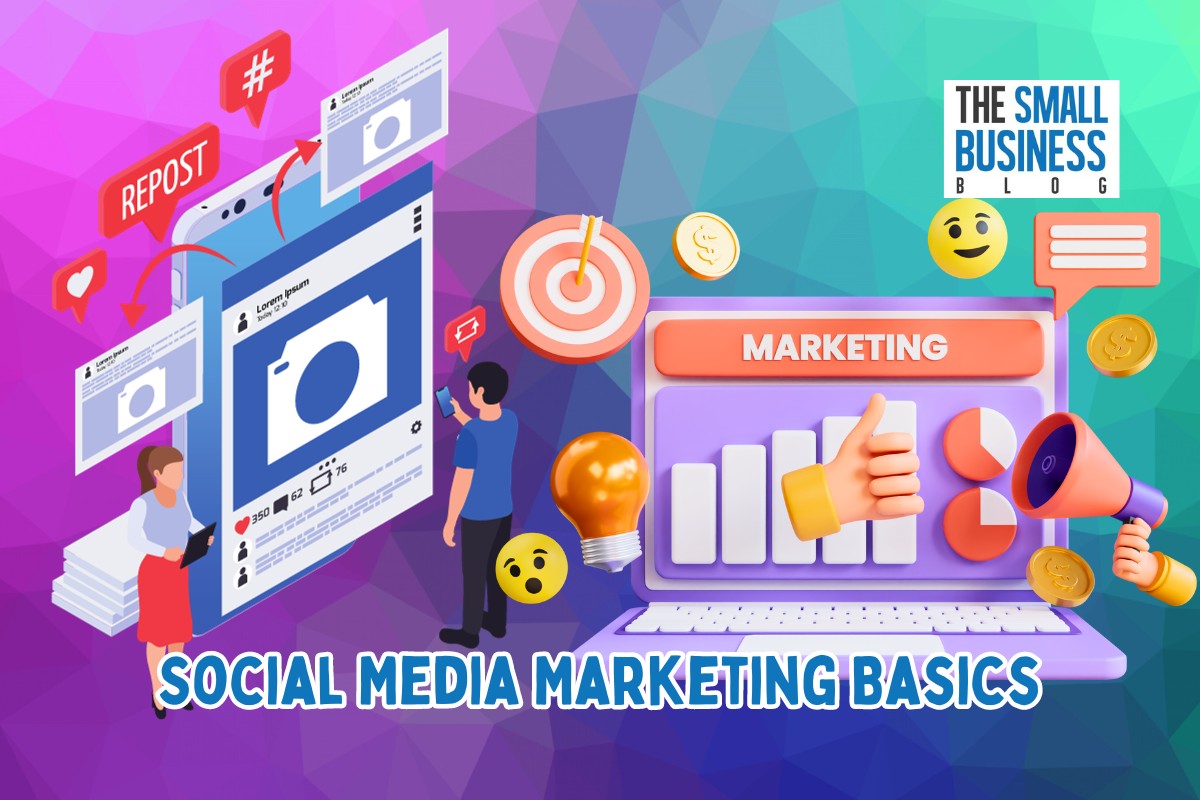Getting yourself out there online is a big deal, whether you’re a business or just doing your thing.
Social media marketing is like the secret sauce for making it happen—it’s all about reaching out to people, making them know your name, and getting them hooked on what you’re all about.
All in all, it is a powerful tool to connect with audiences, build brand awareness, and drive engagement.
Let’s delve into the social media marketing basics, exploring its importance and strategies to build a top brand on social media.
Post Contents
- 1 Social Media Marketing Basics – What Is It?
- 2 Critical Platforms for Social Media Marketing
- 3 Crafting an Effective Social Media Marketing Strategy
- 4 Execution Of Your Social Media Strategy
- 5 Benefits of Social Media Marketing
- 6 Measuring the Success Of Marketing
- 7 Resources for Learning Beyond Basics
- 8 Frequently Asked Questions
- 9 Conclusion
Social Media Marketing Basics – What Is It?

Social media marketing is a dynamic and influential facet of contemporary digital marketing strategies.
It entails making use of social media channels to establish a connection with a target market, increase brand recognition, and advertise goods and services.
The primary objective is to engage users authentically, fostering a community around a brand or business.
One key aspect of social media marketing is creating and sharing compelling content that resonates with the target audience.
Marketers also utilize paid advertising on social media to reach a wider audience and drive specific actions, such as website visits, app installations, or product purchases.
The ability to precisely target demographics and interests makes social media advertising a powerful tool for businesses of all sizes.
Additionally, social media marketing is not only about promotion but also about building relationships.
Through interactions, brands can listen to customer feedback, address concerns, and showcase their human side.
Successful social media marketing campaigns are characterized by authenticity, consistency, and a deep understanding of the platform’s algorithms and user behavior.
Critical Platforms for Social Media Marketing
In the ever-expanding realm of social media, selecting the right platforms is akin to choosing the proper channels to broadcast your message.
Here’s a closer look at some prominent platforms and their distinctive attributes:
1. Instagram

Instagram is a visual paradise, allowing businesses to tell their stories through captivating images and videos.
With its emphasis on aesthetics, this platform is ideal for brands with visually appealing products or services.
The integration of features like Instagram Stories and reels offers dynamic engagement opportunities.
2. LinkedIn

For businesses targeting a more professional audience, LinkedIn stands out.
It’s a platform where industry leaders, professionals, and companies converge.
Create thought-provoking content, share industry insights, and engage in meaningful conversations to build a credible presence.
3. Facebook

Facebook remains a powerhouse, catering to a diverse audience.
It’s an excellent platform for businesses looking to reach a broad demographic.
The versatility of content types, from text posts to live videos, provides ample opportunities for engagement.
Utilize Facebook Groups for community building and niche discussions.
4. X

Twitter, now rebranded as “X,” remains a powerhouse for real-time conversations and instant updates.
This platform, characterized by its posts and dynamic engagement, is a vital space for businesses aiming to connect with their audience quickly and effectively, especially now with their policies on free speech.
Crafting an Effective Social Media Marketing Strategy
A successful social media marketing strategy is more than just posting content; it’s a carefully crafted blueprint aligned with broader marketing objectives.
Let’s delve deeper into the components that make up an effective strategy:
Setting Clear Goals and Objectives
Define specific, measurable, and achievable goals for your social media efforts.
Whether it’s increasing brand awareness, driving website traffic, or boosting sales, clarity in objectives guides your overall strategy.
Identifying Your Target Audience
Understanding your audience is pivotal.
Conduct thorough research to identify demographics, interests, and online behaviors.
Tailor your content to resonate with your target audience, fostering more robust connections.
Planning Content
Content planning extends beyond how often you post and the tone you use.
It involves creating a content calendar, ensuring a mix of content types, and aligning them with your audience’s preferences.
Consistency in messaging and branding enhances recognition.
Execution Of Your Social Media Strategy

With a comprehensive strategy in place, execution becomes the bridge between planning and success.
Here’s a detailed look at how to effectively implement your social media marketing strategy:
Creating Compelling Content
Compelling content transcends mere visual appeal; it’s about weaving narratives that deeply resonate with your audience.
In addition to aesthetically pleasing visuals, consider incorporating user-generated content that showcases real experiences with your brand.
Craft narratives that align with your brand ethos, evoking emotions and connecting personally with your audience.
Whether it’s success stories, customer testimonials, or relatable anecdotes, storytelling is a powerful tool for building a lasting connection.
Utilizing Various Media Formats
To keep your social media presence dynamic, diversify your content using various media formats.
Videos, in particular, are formidable tools for engagement.
Experiment with live videos to provide real-time interactions with your audience.
Tutorials and product demonstrations showcase your offerings and offer valuable insights.
This multimedia approach ensures that your content caters to diverse preferences, capturing the attention of users who may respond more favorably to visual or interactive formats.
Building Engagement
Engagement on social media is more than a one-way communication channel.
Beyond responding to comments, actively participate in conversations.
Pose thought-provoking questions, run polls, and seek input from your audience.
This two-way interaction fosters a community around your brand, making your audience feel heard and valued.
Encourage user-generated content by initiating challenges or featuring customer stories.
By building a dialogue, you strengthen your brand and create an interactive space where your audience feels connected and invested.
Remember, the more engaged your audience, the more likely they are to become loyal advocates for your brand.
Benefits of Social Media Marketing

The advantages of maintaining a robust social media presence extend beyond the quantifiable metrics.
Let’s explore the multifaceted benefits that contribute to the overall success of your brand:
1. Increased Brand Awareness
Brand awareness is not just about being recognized; it’s about being remembered.
Social media exposes your brand to a vast audience, fostering recognition and recall through consistent and impactful messaging.
2. Enhanced Customer Engagement
Social media provides a direct line of communication with your audience.
Real-time interactions, personalized responses, and community-building initiatives contribute to fostering meaningful relationships with customers.
3. Improved Website Traffic
Sharing valuable content, blog posts, and promotions through social channels directs traffic and contributes positively to your website’s SEO ranking.
Measuring the Success Of Marketing
Understanding the impact of your social media efforts goes beyond surface-level metrics.
Analytics platforms provide a treasure trove of information.
Dive into data on audience demographics, peak engagement times, and content performance.
This information guides future content strategies.
Identifying and monitoring Key Performance Indicators (KPIs) is crucial for assessing success.
Reach, engagement, conversion, and click-through rates provide a comprehensive view of your social media performance.
Resources for Learning Beyond Basics

Many resources are available for those looking to delve deeper into social media marketing.
Here’s an expansive view of learning avenues:
1. Online Courses and Certifications
Numerous online platforms offer comprehensive courses and certifications in social media marketing.
These courses cover strategy development, content creation, and analytics from beginner to advanced levels.
2. Books and Publications
Explore books written by industry experts to gain in-depth knowledge.
Publications from renowned marketers provide insights into successful strategies, case studies, and the evolving landscape of social media.
3. Industry Experts and Blogs
Follow industry experts and influential blogs to stay abreast of the latest trends and insights.
Many experts share their experiences, best practices, and predictions for the future of social media marketing.
Frequently Asked Questions
Is social media marketing only for businesses?
Social media marketing extends its benefits to both businesses and individuals.
It is a versatile tool, allowing individuals to build personal brands, showcase talents, and connect with like-minded individuals.
It provides businesses with a platform to promote products, engage with customers, and establish a digital presence.
How often should I post on social media?
The frequency of social media posts depends on your specific goals and the nature of the platform.
While consistency is crucial to maintaining audience engagement, it’s equally important to prioritize the quality of content over sheer quantity.
Understanding your audience’s preferences and the platform’s dynamics guides the optimal posting frequency.
Do I need to use paid advertising on social media?
Paid advertising can greatly increase awareness on social media, even though organic reach is still important.
Paid ads allow you to target specific demographics, increase brand exposure, and drive targeted traffic.
It’s a worthwhile investment as part of a comprehensive marketing strategy.
Can I use the same content across all social media platforms?
While some content can be repurposed, tailoring content for each platform is critical.
Each social media platform has its unique audience demographics and features.
Adapting content to align with each platform’s tone, format, and preferences ensures maximum impact and resonance with the intended audience.
Conclusion
In essence, social media marketing is not just a trend but a fundamental aspect of modern marketing.
By understanding the social media marketing basics, crafting a solid strategy, and staying informed, you can harness the power of social media to elevate your brand and connect with your audience effectively.
Remember now that you have the basics; the key to success in the digital marketing world is to embrace change and continuously learn.






























